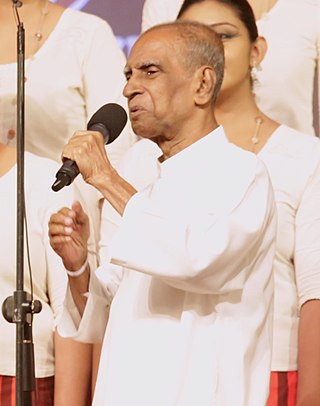Related Research Articles
Baila is a form of music, popular in Sri Lanka and among Goan Catholics in India. The genre originated centuries ago among the Portuguese Burghers and Sri Lankan Kaffirs. Baila songs are played during parties and weddings in Sri Lanka, Goa, and Mangalore accompanied by dancing.
Mahagama Sekera was a famed Sri Lankan poet, lyricist, playwright, novelist, artist, translator and filmmaker. He is considered to be a groundbreaking figure in Sinhalese poetry and literature. He is best remembered as a poet and songwriter with several of his works even becoming popular songs in Sri Lanka. His works occasionally have an introspective Buddhist-influenced outlook. His poems and songs remain widely quoted on the island nearly thirty years after his death.

Sri Lankabhimanya Wannakuwattawaduge Don Albert Perera, better known by his adopted name Amaradeva, was a prominent Sri Lankan Sinhalese vocalist, violinist and composer. Primarily using traditional instruments like sitars, tablas and harmoniums, he incorporated Sinhala folk music with Indian ragas in his work. Many consider his contribution to the development of Sinhala music as unmatched; hence, he is occasionally cited as the "Maestro of Sri Lankan Music".

Sri Lankan cinema encompasses the Sri Lankan film industry. It is a fledgling industry that has struggled to find a footing since its inauguration in 1947 with Kadawunu Poronduwa produced by S. M. Nayagam of Chitra Kala Movietone. Sri Lankan films are usually made in Sinhala and Tamil, the dominant languages of the country.
Sarasaviya Awards is an award bestowed to distinguished individuals involved with the Sinhala cinema, each year by the Sarasaviya weekly newspaper in collaboration with the Associated Newspapers of Ceylon Limited, Sri Lanka in recognition of the contributions made by them to the Sri Lankan film industry. The Sarasaviya ceremony is one of the oldest film events in Sri Lanka. The awards were first introduced in 1964. The Sarasaviya Awards have been often referred to as the Sinhala Cinema industry's equivalent to The Oscars.
Deshamanya is the second-highest national honour of Sri Lanka awarded by the Government of Sri Lanka as a civil honour. It is awarded for "highly meritorious service", and is conventionally used as a title or prefix to the recipient's name.
Wasana is a 1976 Sinhalese language romance film directed by K.A.W. Perera. The film stars Geetha Kumarasinghe, Vijaya Kumaranatunga and Malini Fonseka made notable roles. Also this film was the cinema debut of popular Sri Lankan film actress Geetha Kumarasinghe.
![<i>Ran Salu</i> 1967 [[Dominion of Ceylon|Sri Lanka]] film](https://upload.wikimedia.org/wikipedia/en/thumb/3/32/Scene_from_RAN_SALU.png/320px-Scene_from_RAN_SALU.png)
Ran Salu is a 1967 Sri Lankan drama film directed by Lester James Peries. The film follows the parallel paths of Sujatha and Sarojini Perera.
Asoka is a 1955 Sri Lankan romantic musical based on the Bollywood film Sheesa.
Don Ruter Nanayakkara was a Sri Lankan actor in Sri Lankan cinema as well as in British drama. Playing lanky villains and comedic characters, Nanayakkara gained popularity in movies like Rekava, Kurulu Bedda, and Sikuru Tharuwa. He also appeared as the old shaman in Steven Spielberg's 1984 Oscar-winning movie Indiana Jones and the Temple of Doom.
Jayasinghe Arachchige Milton Perera, popularly known as Milton Perera, was a singer, composer and playback singer of Sri Lankan cinema. One of the most respected artists in Sri Lanka, Milton Perera rendered his voice to diverse array of artists as a playback singer for many films in a career spanned for more than three decades. He was the leading playback singer of Sri Lankan cinema during the 1960s and 1970s.
Kurulu Bedda is a 1961 Sri Lankan drama directed by L. S. Ramachandran and written by P. K. D. Seneviratne. It attempted to follow in the precedent set by Rekava and create a truly Sinhala film.
Bicycle Hora is a 1968 Sri Lankan Black and white thriller film directed by K.A.W. Perera and produced by E. A. P. Edirisinghe for EAP Films. The film stars Oswald Jayasinghe and Sandhya Kumari in lead roles whereas Jeevarani Kurukulasuriya, D. R. Nanayakkara and Wally Nanayakkara made supportive roles. Film music score done by Premasiri Khemadasa.
Asokamala is a 1947 Sri Lankan historical film co-directed by Shanthi Kumar and T. R. Goppu and produced by Sir Chittampalam A. Gardiner. It was the second film made in the Sinhalese language and the first by a Sinhalese director. It also was the first film that W. D. Albert Perera, Mohideen Baig and Mohammed Ghouse contributed to. The melodies of the songs of 'Asokamala' were original ones devised by Mohamed Ghouse- a departure from what was to be the copying of Indian melodies in the time to come.
Heendeniya Vidanaralalage Punya Heendeniya, popularly as Punya Heendeniya, is a former Sri Lankan cinema actress who resides in England.
Saaravita is a 1965 Sri Lankan Sinhala comedy thriller film directed by Tissa Liyanasuriya and produced by Shesha Palihakkara for Serendib Films. It stars Joe Abeywickrama in lead role along with Wally Nanayakkara, Thilakasiri Fernando and Jeevarani Kurukulasuriya. Music composed by W. D. Amaradeva. It is the 126th Sri Lankan film in the Sinhala cinema.
Abeykoon Mudiyanselage Thalatha Abeykoon [Sinhala]), popularly as Thalatha Gunasekara, was an actress in Sri Lankan cinema. She is the mother of popular actress Nadeeka Gunasekara.
Pathirajawasam Kudahitige Don Seneviratne was a prominent Sri Lankan poet, journalist and a scriptwriter in Sinhala cinema. Considered as foremost independent screenwriter in Sri Lankan cinema, Seneviratne wrote several popular films such as Kurulu Bedda, Sikuru Tharuwa, Parasathu Mal and Ran Salu. He was a popular poet of the Colombo period.
Richard Herbert Seneviratne, popularly as Herby Seneviratne, was an actor and filmmaker in Sri Lankan cinema.